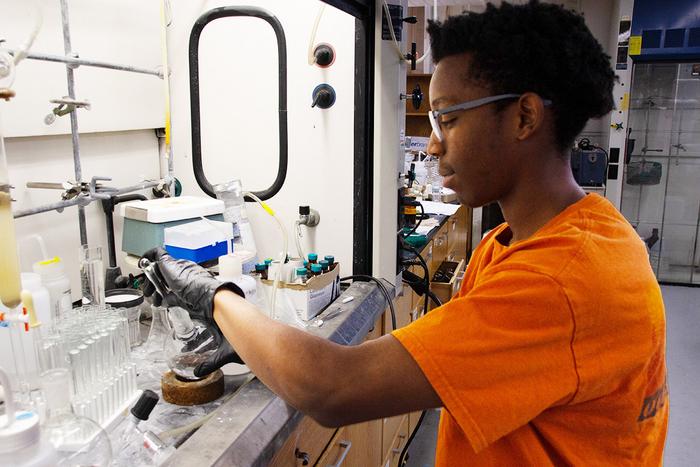University of Tennessee’s Assistant Professor Joshua Baccile has recently secured a prestigious Maximizing Investigators’ Research Award (MIRA) from the National Institutes of Health (NIH). This grant, distinct from typical research funding, champions a researcher’s broader lab vision, supporting comprehensive inquiries under the MIRA umbrella. Baccile’s research home focuses on delving into the enigmatic realm of five-carbon metabolism within the human body, a domain that holds significant implications for our understanding of long-term health outcomes. With this grant of $1.8 million over five years, Baccile aims to expand not just his research capabilities but also to shed light on the complexities of human metabolic pathways that remain poorly understood.
His lab’s inquiries center around the isoprenoid pathway, a metabolic route through which the human body synthesizes cholesterol. Cholesterol is not merely a byproduct of metabolism; it is a crucial component involved in numerous physiological processes, including cellular membrane integrity and hormone production. Statins, a class of drugs commonly prescribed to manage high cholesterol levels, primarily function by inhibiting this pathway, effectively reducing the concentration of five-carbon precursors that play a pivotal role in cholesterol synthesis. Despite their widespread use and clinical significance, the full range of implications associated with these five-carbon precursors remains largely obscure—a gap that Baccile’s research seeks to bridge.
Baccile notes the irony in the lack of understanding surrounding the very precursors targeted by such commonly prescribed medications. As he posits, statins are effective largely because they interfere with this five-carbon metabolic pathway, yet the biological roles of these intermediate molecules are not comprehensively mapped out. Therefore, Baccile’s ambitious research agenda aims to uncover what else these precursors accomplish within the metabolic maze of human physiology.
Leveraging unique derivatives of two five-carbon precursors, his team is set to introduce these molecules into cellular environments to probe their potential effects. By experimenting with these derivatives, the Baccile Lab intends to unravel the multifaceted roles of five-carbon metabolism. This innovative approach not only aims to clarify the molecules’ functions but also aspires to harness control over their distribution and activity within cellular systems. Such discoveries could mark a significant advancement in our comprehension of metabolic processes that underlie various health issues, from dyslipidemia to systemic diseases.
The pioneering nature of Baccile’s work cannot be overstated. His laboratory holds the distinction of being the first to develop functional derivatives of five-carbon precursors suitable for experimental use. This novel capability opens up exciting avenues for exploration in the metabolism of cholesterol and the broader implications it may have on human health. By better understanding the roles of these crucial molecules, Baccile’s research has the potential to redefine therapeutic strategies targeting fundamental metabolic pathways.
Through the NIH MIRA grant, Baccile hopes to not only advance the scientific community’s understanding of human biology but also foster collaborative relationships with international research teams. The competitive nature of academic research has made it increasingly imperative for scientists worldwide to join forces in tackling the complexities of the microbiological landscape. Baccile advocates that when engaging in scientific discovery, researchers must navigate uncharted territories, particularly regarding human cellular physiology.
One of the salient elements of Baccile’s vision relates to the potential impacts of his research on pressing health issues such as cardiovascular diseases, neurodegenerative disorders, and various forms of cancer. Understanding the intricate operations of five-carbon precursors could illuminate novel pathways for therapeutic intervention, paving the way for more targeted treatments aimed at prevalent health concerns. As Baccile articulately explains, knowledge gained through research contributes significantly to the advancement of medical therapies, potentially leading to improved health outcomes for numerous patient populations.
Moreover, the MIRA grant is not solely a funding mechanism for Baccile’s research—it also facilitates the continuation and expansion of his community college research fellowship program. This initiative offers summer research opportunities for students from local community colleges who aspire to transfer to a four-year institution. Baccile’s commitment to fostering the next generation of scientific talent embodies the educational ethos underpinning academic research environments.
The grant’s provision of $1.8 million over a five-year duration presents an excellent opportunity not only to propel Baccile’s research forward but also to contribute to the educational pipeline of future scientists. By engaging undergraduate and community college students in meaningful research experiences, Baccile is effectively investing in the future of scientific inquiry and innovation. He emphasizes that a crucial responsibility of academic research labs is nurturing students and future scientists who will sustain the quest for knowledge and stimulate further discoveries in biology and medicine.
Through this blend of groundbreaking research and educational mentorship, Baccile stands at the forefront of bridging the gap between basic science and clinical applications in human health. His efforts to understand how five-carbon metabolism influences various physiological functions could potentially lead to the development of novel treatment strategies that address significant health challenges. The implications of this research extend far beyond the laboratory setting and could reshape clinical practices in the years to come.
In summary, Baccile’s MIRA award underscores the importance of comprehensive approaches to scientific inquiry—one that melds deep research aspirations with a commitment to education and mentorship. As research teams around the globe embark on similar missions, the ongoing exploration of metabolic pathways such as the isoprenoid pathway promises to enrich our understanding of human health and refine therapeutic frameworks aimed at combating chronic diseases. The investment in Baccile’s research exemplifies the NIH’s commitment to supporting innovative and high-impact science, a crucial element in the pursuit of advancing public health.
Subject of Research: Five-carbon metabolism and its implications for human health
Article Title: University of Tennessee’s Joshua Baccile Awarded NIH Grant to Explore the Depths of Human Metabolism
News Publication Date: [Insert Date]
Web References: [Insert URLs]
References: [Insert References]
Image Credits: University of Tennessee
Keywords
Discovery research, Neural pathways, Metabolic networks, Molecular networks




